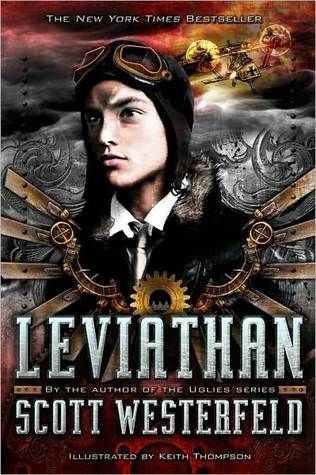Leviathan
by Scott Westerfeld, illustrated by Keith Thompson
Simon Pulse
October 2009
Leviathan is an unusual steampunk adventure, as the action is set during an alternate history of World War I, rather than the Victorian period. In this story, the British style themselves as "Darwinists" and have a formidable air force composed of genetically modified "beasties." Their German opposition, known as "Clankers" use over-sized metallic walkers and tanks. The story follows, in mostly alternating chapters, two young protagonists, Deryn, a.k.a. Dylan Sharp, a midshipman in the British air navy and Aleksander Ferdinand, son of the murdered Austrian Arch-Duke and a budding Clanker pilot.
Deryn, the new Darwinist recruit, is hiding a secret -- "he" is actually a "she." Her brother and recently-deceased father have given her an unconventional upbringing and encouraged her interest in flying, even though only men are allowed in the air service. I felt that Westerfeld really hit the right note with Deryn. It's such a common science-fiction and fantasy trope to have a young girl disguise herself as a boy in order to go off and have adventures... but it's pretty uncommon to see characters address this problem with the seriousness that it deserves. Deryn spends the first three-quarters of the novel terrified that she will be found out. Being caught is her number one concern, and it drives most of her decisions, including her impetous piloting and her foul mouth. (Westerfeld's gritty street vernacular includes terms like, "clart," "boffin" and "barking spiders.")
Alek is the son of the recently murdered Arch-Duke Ferdinand of Austria. He is on the run, aided by two of his loyal retainers, and remains one step ahead of the war-mongering Germans, as he attempts to re-group and prove his legitimacy.
The thing that surprised me the most about Leviathan was my own reaction to the Darwinists. I found myself thoroughly skeeved out by the description of the living airships, with their attendant symbiotic life-forms creating a self-sustaining biosphere. A typical ship would be mostly whale, with perhaps a bit jellyfish and a number of other "life threads" mixed in. It would be accompanied by double-nosed hydrogen sniffing dogs, flocks of bats and birds, messenger lizards and more. Plenty of thought went in to how the living airships would be fed and how waste management would be handled. Oddly, the "Clanker" steam-driven technology, appealed to me much more. How awesome would it be to pilot one of those? From the description in the book, they sound just like the AT-AT walkers from Star Wars.
I'll recommend this for Westerfeld fans, and steampunk aficionados looking for something a little different.
Compare to:
Mortal Engines - Philip Reeve
The Bloomswell Diaries - Louis L. Buitenbag
Soulless - Gail Carringer
I borrowed this book from the library.

No comments:
Post a Comment